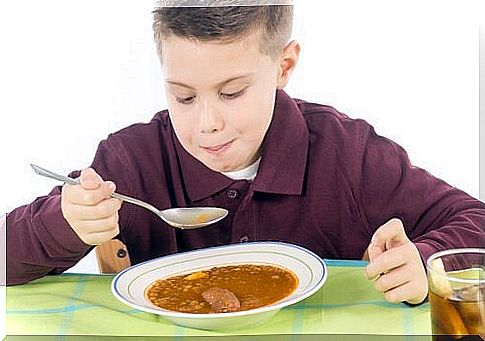Strengthening Children’s Immune Defenses

Consuming foods to strengthen the immune defenses of children is of vital importance to prevent them from being frequently affected by viral infections. Plus, it will make them grow healthy.
Nutritional deficiencies related to proteins, carbohydrates and healthy fats – such as those of olive oil, fruit and vegetables rich in vitamins A, C, E and D – do not allow the child’s immune defenses to fight disease.
To avoid this, we present a complete list of foods with which to strengthen the immune defenses of children ; we also suggest some good and simple recipes to prepare.
Balanced nutrition
Following a balanced and healthy diet guarantees children an excellent state of health ; in this way their immune system can effectively fight any disease. This is especially true for viral infections common in childhood.
Nutritionists argue that children absolutely must eat all food groups, except for those with particular pathologies or food allergies or intolerances.
But what happens when children do not consume the foods that contain the main nutrients?
Proteins
When children do not consume enough protein – red and white meat, fish – they experience a decline in lymphocyte formation. These cells are responsible for the optimal work of the immune system.
Carbohydrates
Carbohydrates are present in products such as rice, pasta, flour, cereals or potatoes. These foods bring energy, necessary to defend the body.

Fat
When nutritionists say babies need to get fat, they always make it clear which type. Although the absence of a food harms the baby’s immune system, the same is true if you eat a poor quality product.
It happens precisely with this group of nutrients. If the child consumes saturated fats that come from industrial confectionery, sausages, or trans fats, there will be an almost immediate and considerable reduction in the immune system.
The only fats recommended for toddlers are omega 3, found in olive oil and some fruits such as avocado.
Vitamins of fruits and vegetables
Of all the food groups, the ones that provide the most vitamins and minerals are fruits and vegetables. It is impossible to strengthen the immune defenses of children if they do not ingest these nutrients in quantity. Their health is affected in many ways and the cells of the immune system are oxidized.
Foods to strengthen the immune defenses of children
The foods that contribute the most to increasing the immune defenses of children are all those that contain vitamins A, E, C, D, minerals, iron and zinc. Among these stand out:
- Carrot
- Broccoli
- Chard
- Pumpkin
- Avocado
- Orange
- Apple
- Lemon
- Kiwi
- Papaya
- Grapefruit
- Oats
- Lettuce
- Honey
- Dried fruit
- Eggs
- legumes
- Salmon
- Tuna

Recipes to strengthen the immune defenses of children
It can be difficult to get children to eat the right amount of fruit and vegetables to keep them in good health. However, we can make drinks with which to combine different ingredients that are healthy and that they will love thanks to the intense flavor of their favorite fruits.
The best smoothies to strengthen children’s immune defenses are:
- Strawberry, orange and guava.
- Apricot, orange and grape.
- Red currant, spinach and orange.
- Red currant, lemon and apple.
- Pumpkin and carrot.
- Orange and carrot.
- Cold or hot lemonade with honey.
- Apple, ginger and parsley.
- Apple, lettuce and sesame.
- Pineapple and almonds.
- Strawberries and mangoes.
Remember that children should consume at least two servings of fruit and vegetables a day, especially citrus fruits like orange, lemon and tangerine, rich in vitamin C. It is equally important to include nuts, yogurt, honey, cereals, meat and legumes in their diet at least twice a week.









